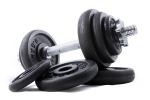|
2002/11/03, 02:14 PM
I am curious about this. Coming from a woman this might seem odd, but I truly want to understand this.
When you measure the bicep/tricep arm straight out and get
Then 11 1/2......Now 11 1/2
Then you bring your arm to a 90 deg angle unflexed and measure Then 12.......Now 11 3/4
Flexed and get
Then 12 1/2...... Now 12 1/2
Is there any way to determine from these numbers if you have gained muscle/lost fat?
Also is there any way to determine how much more fat needs to be lost?
Thanks.
:) Melissa
----------------------------
Excellence is an art won by training and habituation. We do not act rightly because we have virtue or excellence, but rather we have those because we have acted rightly. We are what we repeatedly do. Excellence, then, is not an act but a habit.
- -- Aristotle
|
|
|
|
2002/11/03, 02:45 PM
Mandre: Great question...You may try using this method. EVery 2 weeks, or the period of your choice, just make sure it is the same time and without a pump, take a FLEXED bicep measurement, and a waist measurement. You will get a ratio between the 2.For ease of numbers, say your bicep is 15, and waist 30. This is a 1:2 relationship. This ratio must not go up. If it is, you are probably gaining fat. If it decreases, or stays the same, you are probably gaining muscle somewhere. An easy way without calipers and stuff to track your bodyfat somewhat.
|
|
2002/11/05, 06:08 PM
I get that part and yipppeeeee the waist is still getting smaller.
What I was trying to figure out is if you can tell how much muscle you put on your arms as well as the other body parts.
Trying to figure out if we are doing the caliper right. I know it is hard to put on muscle and lose fat at the same time. According to the tape measurements and calipers that is what is happening.
Is the rule of thumb for every inch you put on your arms it is about 10 lbs of muscle?
:) Melissa
--------------
Excellence is an art won by training and habituation. We do not act rightly because we have virtue or excellence, but rather we have those because we have acted rightly. We are what we repeatedly do. Excellence, then, is not an act but a habit.
- -- Aristotle
|
|
2002/11/05, 07:28 PM
I have heard that figure, but cannot back it up. I would just go by the tape. If the ratio is going down, great, you know you have gained in your bicep at least. But even if it has stayed the same, and you are getting stronger, even the scale going up, it is most likely muscle. Great to hear your progress! Keep it up.
|
|
2002/11/07, 02:04 PM
Aaahhhh, I see where you're going. I wouldn't worry so much about how much muscle you've put on. Often if you're looking for quantifiable results, you're going to get discouraged in the short term. Just look long term and don't worry about how much. If you must measure something, measure the increases in your lifts.
|
|
2002/11/07, 07:12 PM
Hey mackfactor,
Yeah I understand what you are saying. I do measure my progress in many different ways.
I feel as women we should be thinking about gaining/ losing muscle for that is what helps us burn those extra calories. It raises our metabolisms and we can consume more calories. I am not an advocate of the 1200 calorie diet. Short term you will see results but at the expense of losing valuable muscle.
For example say a woman exercises her butt off and loses 30 lbs, out of that 30lbs she lost 10lbs of muscle. She just lost 300-500 calories she could be eating daily for maintenance. Then comes along that stupid yo-yo dieting.
A woman who exercises with proper nutrition maintains or gains muscle will have a better time when she is ready for maintenance. This way in the long run she can avoid that yo-yo dieting.
Plus I asked because I wanted to make sure we were doing the tape measure and caliper correctly because I know it is hard to do both at the same time.
Take care.
:) Melissa
--------------
Excellence is an art won by training and habituation. We do not act rightly because we have virtue or excellence, but rather we have those because we have acted rightly. We are what we repeatedly do. Excellence, then, is not an act but a habit.
- -- Aristotle
|




